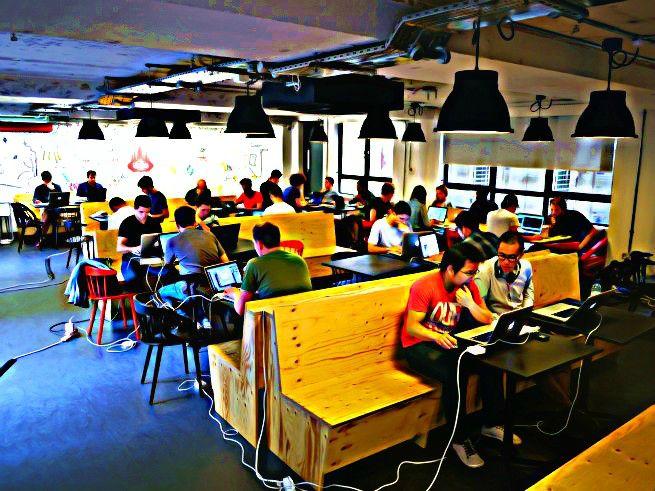Did you know that the Collaborative Economy is well and truly in full swing? Some call it collaborative economy, others “the sharing economy” or collaborative consumption, as definitely there is still a bit of confusion which is which. What is novel about this new economic model is that is based on shared ownership and access. This is shared between people, governments, organizations and start-ups. This is having the effect of moving power away from large corporations. One of the drivers of the Collaborative Economy is social networks that are used to help facilitate interactions between these different groups. They include makers, and they share and pass on goods beyond physical borders. This has led to people around the world finding new ways to generate income and cut back on feeling reliant on other people.
Jeremiah Owyang (2013) writing for Web Strategist points out that he is living in the Collaborative Economy. Examples of the activities he does that demonstrate this are his staying in strangers’ homes, lending his car to a stranger and using crowd based services to get work done for a cheaper price, as and when he needs it. Indeed, as Owyang explains:
“The impact this can have to opportunity markets all across the globe can offer new ways to generate income, share what’s valuable and reduce dependency on others.”
Examples of collaborative economy
Whatare some examples of the Collaborative Economy pointed out by Jeremy Owyang ? Well, perhaps one of the most important are crowdfunding websites. Websites such as Indiegogo, Kickstarter, Gofundme, CircleUp and OurCrowd allow people to gain access to the money of many to be able to power their ventures and get underway. In the money lending market, organizations like Kiva promote micro lending to people in developing countries, while other lending organisations are also changing the way that the economy functions, such as Prosper, LendingClub and GreenNote. Remaining on the subject of money, bitcoin solutions or so-called “crypto currencies” including bitcoin, dogecoin, litecoin, namecoin and Peercoin facilitate easier business online.
In terms of goods, the Maker movement has led to sales in different ways through organisations like Etsy, The Grommet, shapeways and Quirky. These websites have transformed the market for bespoke goods. Meanwhile getting access to other cheap goods, or second hand goods so that there is less waste is achieved through websites such as eBay, Craigslist and Yerdle.
There is also more opportunity to loan goods in the Collaborative Economy, and this is where organisations like Rent The Runaway and Shop it to Me have come into play. It is not just money that is being shared. Food is being shared rather than wasted in the Collaborative Economy. Companies like Cookening, EatWith, Meal Sharing and Feastly have played a part here. Meanwhile, Munchery, Blue Apron and Kitchen Surfing among others have all created shared opportunities for food preparation.
Collaborative Economy and Services
The Collaborative Economy has made it much easier to find people that can provide services. For example, professional services in a range of different categories may be sourced from companies like Elance, ODesk, Crowdspring, Freelancer.com and BidWilly. Personal services can also be contracted out. Organisations such as TaskRabbit, Shyp, MyTaskAngel and Popexpert have all made this possible. Transportation services are also different in the collaborative economy. For loaning vehicles, organisations like Scoot, Car2Go and DriveNow have changed the face of the industry. Meanwhile companies like Uber, Hail and Lyft have made it easier to contract transportation services as and when needed, and have also led to fairer prices for these services.
Even space is shared in the Collaborative Economy. In particular there are many opportunities for sharing people’s homes in order to be able to travel more easily and often more cheaply. Think Couchsurfing where participants stay for free on a person’s couch or in their spare room and may only buy their host a meal. There are also more expensive options like AirBnb where a person may rent out a spare room to those that are coming into town. In terms of office space there are also options. ShareDesk, Pivotdesk and Liquidspace are just some of these.
Will the collaborative economy change the world ?
The Collaborative Economy that Owyang describes can clearly be seen to be changing the way that we do absolutely everything. It is also creating a large number of opportunities for people to be more innovative and entrepreneurial where such opportunities may not have existed in the same way in the past. The Collaborative Economy is revolutionising just about everything. It will be interesting to see where it goes next and where further collaboration can lead.

Paula Newton is a business writer, editor and management consultant with extensive experience writing and consulting for both start-ups and long established companies. She has ten years management and leadership experience gained at BSkyB in London and Viva Travel Guides in Quito, Ecuador, giving her a depth of insight into innovation in international business. With an MBA from the University of Hull and many years of experience running her own business consultancy, Paula’s background allows her to connect with a diverse range of clients, including cutting edge technology and web-based start-ups but also multinationals in need of assistance. Paula has played a defining role in shaping organizational strategy for a wide range of different organizations, including for-profit, NGOs and charities. Paula has also served on the Board of Directors for the South American Explorers Club in Quito, Ecuador.




























